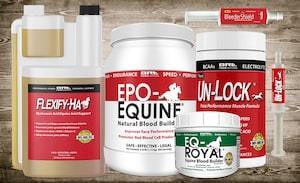
If your horse isn’t sweating enough, or at all, it could be an indicator of a serious disease. But how do you know if our horse is sweating normally?
Just like humans, horses sweat to keep cool. But thermoregulation is particular importance in performance horses, which control their body temperature mainly by sweating. It's so important, in fact, that lack of sweating in horses can even lead to death.
Why Isn't My Horse Sweating?
If you notice your horse doesn't sweat as expected, he could have a disorder called anhidrosis. Horses afflicted with the disorder may sweat only in certain areas of the body, while some don’t sweat at all. While uncommon, anhidrosis can be serious — even life-threatening.
The cause of anhidrosis is unknown, but it seems to be more prevalent in hot, humid areas, like Florida. Also, one study1 found more cases in non-pregnant broodmares and horses in training programs; the same study showed that young horses were rarely affected, and that dark horses seem to be more affected than light-colored horses.
Symptoms of Anhidrosis
If you notice any of the following symptoms of anhidrosis in your horse, contact your vet immediately:
- Panting, especially after exercise
- Rapid heart rate
- Diminished/weak appetite
- Rapid/increasing respiratory rate
- Fatigue/decline in performance
- Flared nostrils
- Sweating only in certain spots
- No sweating after vigorous activity
- Collapse, when serious
Diagnosis
Your vet can diagnose anhidrosis. Here’s how:
- Injections to try to stimulate sweat glands
- Bloodwork for electrolyte analysis
Armed with results from these tests, your vet can help you formulate a plan.
Anhidrosis Treatments
Unfortunately there’s no cure for anhidrosis, but there are management options. Here are some common treatments and recommended accommodations for afflicted horses:
In addition, a University of Florida study showed limited improvement with herbal supplementation and acupuncture, but more studies are needed. Some medications have been tried, but without success. So for now, it looks like the best treatment is a good management plan that works for you and your horse.
Outlook
While research continues, many horses afflicted with anhidrosis have to be moved to cooler climates and/or forced out of training and competitions. But with the right management strategies, your horse can live a normal life.
13 Mayhew, I.G., and H.O. Ferguson. 1987. Clinical, clinicopathologic, and epidemiologic features of Anhidrosis in central Florida Thoroughbred horses. Journal of Veterinary Internal Medicine. 1(3):136-141.
Top trainers, owners and competitors rely on BRL Equine products to help their horses perform at their very best. You can get the same great results! Our all-natural equine nutritional supplements really work... guaranteed or your money back!





Also in Horse Tips and More
Top 10 Ways to Show Your Horse You’re Thankful For Him
November 01, 2021
View full article →
5 Ways to Prepare Your Barn For Summer
May 03, 2021
View full article →
Your New Spring Horse Health Checklist
March 12, 2021
View full article →